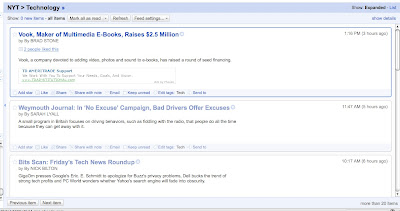Trends from my Google Reader account.
Many people want to delay the inevitable death of the printed newspaper because of nostalgia or self-preservation. But the print model does offer one thing that we don't get from RSS feeds: someone deciding for us what's important, and what's trivial enough to skip.
In a newspaper, the most important stuff is on the front page. The bigger the headline and the higher up on the page, the more the editors are vouching for the story's news value:
Not so with RSS readers. RSS is an extremely powerful tool. Instead of visiting 90 news sites and blogs each day, you can have the latest information collected for you in one place, waiting for you whenever you're ready for it. But there is no sorting, just an endless string of items:
For those of you who use RSS, and especially if you're following dozens of feeds, you have to quickly judge whether something is worth your time. In journalism school, I was taught that a story must get to the point within the first seven words of the opening paragraph, or readers will lose interest. With so many articles in any day's paper, there was little point in continuing to read one that didn't interest you.
But with online news, the amount of competing information available is almost infinitely more. I've found that if I'm not grabbed within the first three or four words of the headline, I'll just click "next item" and skip it (yes, I won't even read the entire headline sometimes). I read only about 25 percent of the items that come over my feeds, so a lot my time is spent shifting through useless information.
And this is even after I've chosen to follow only the feeds I find most interesting. Many sites offer specialized feeds for only certain topics. For example, I don't follow everything from Greater Greater Washington, only its transit section.
Can the Web reproduce the value created by the newspaper editor, who not only decides what is fit for publication but also how prominently items are displayed? Many news sites still using varying headline sizes to show story prominence (the New York Times is a good example), but again, the point of using RSS is to avoid manually visiting dozens of sites you want to follow.
In some ways, the Web does a better job of filtering. The newspaper editor's filtering is only valuable if you and the editor have the same tastes. Instead, various computer systems attempt to automate the recommendation process based on what you're already reading, including Google Reader's suggested items feature and WordPress's related posts widget.
However, some people have stopped using RSS all together (not to mention newspapers and online news sites). Instead, they get their news from snippets and links from their friends on Facebook or Twitter. As one writer says, "It makes me feel guilty. I have 1,000 unread items. Twitter doesn't tell me that."



6 comments:
It's a monthly chore to ditch feeds I either don't read (not enough interesting content) or are lacking in content altogether (mostly lazy blogger friends). I enjoy the chore though because I at least know I haven't missed anything. Anything. ANYTHING. (Yes, I'm yelling.)
But you can have a "front page" in your RSS reader. That's what the folders are for. I have the stuff that I really don't want to miss all in one folder--this blog included!
Well, but if I posted 30 items a day, there's no way for you to tell which ones are the most important, aside from manually scanning through them.
I already sort of scan, honestly. In Reader you can hit "J" to jump to the next post and "K" to jump back to the previous. I often jump around a bit before going back and deciding which posts I want to read. If necessary, I sometimes mark a post to look at later when I have more time.
In fact, that's what I did for this post because I saw it mere minutes before I left to go hang out with you! :D
And besides the problem of the quantity of posts, there's also the problem of length.
Scott Sumner doesn't put out a huge quantity of posts, but just about all of them are essay-length. I almost always put them aside to read later.
I've found myself being turned off by the infrequent, long blog post style, like they have in the Becker-Posner blog (plus, there's nothing more exciting to have in your masthead than two aging white guys). It seems like the medium isn't built for it.
Post a Comment